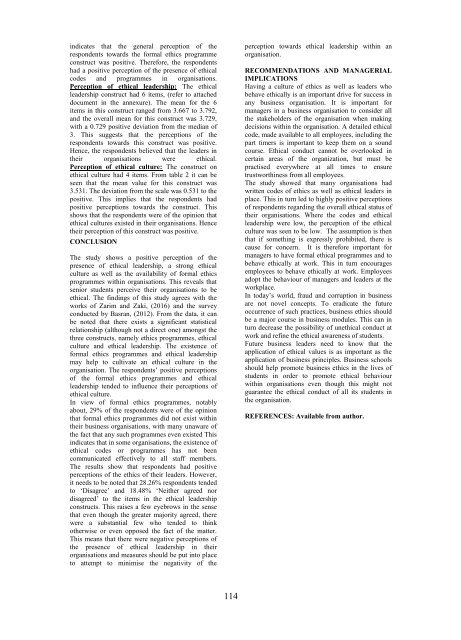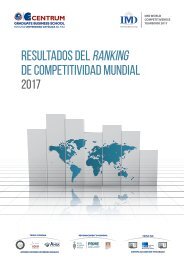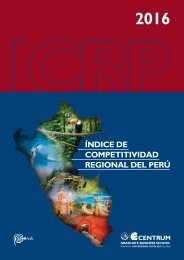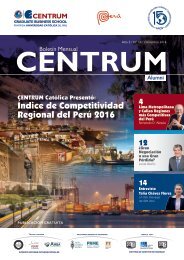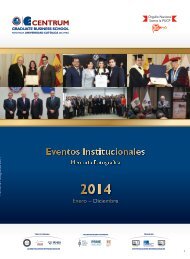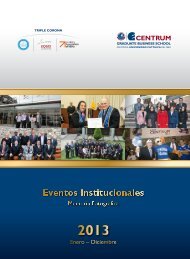Pan-Pacific Conference XXXIV. Designing New Business Models in Developing Economies
This publication represents the Proceedings of the 34th Annual Pan-Pacific Conference being held in Lima, Peru May 29-31, 2017. The Pan-Pacific Conference has served as an important forum for the exchange of ideas and information for promoting understanding and cooperation among the peoples of the world since 1984. Last year, we had a memorable conference in Miri, Malaysia, in cooperation with Curtin University Sarawak, under the theme of “Building a Smart Society through Innovation and Co-creation.” Professor Pauline Ho served as Chair of the Local Organizing Committee, with strong leadership support of Pro Vice-Chancellor Professor Jim Mienczakowski and Dean Jonathan Winterton.
This publication represents the Proceedings of the 34th Annual Pan-Pacific Conference being held in Lima, Peru May 29-31, 2017. The Pan-Pacific Conference has served as an important forum for the exchange of ideas and information for promoting understanding and cooperation among the peoples of the world since 1984. Last year, we had a memorable conference in Miri, Malaysia, in cooperation with Curtin University Sarawak, under the theme of “Building a Smart Society through Innovation and Co-creation.” Professor Pauline Ho served as Chair of the Local Organizing Committee, with strong leadership support of Pro Vice-Chancellor Professor Jim Mienczakowski and Dean Jonathan Winterton.
You also want an ePaper? Increase the reach of your titles
YUMPU automatically turns print PDFs into web optimized ePapers that Google loves.
<strong>in</strong>dicates that the general perception of the<br />
respondents towards the formal ethics programme<br />
construct was positive. Therefore, the respondents<br />
had a positive perception of the presence of ethical<br />
codes and programmes <strong>in</strong> organisations.<br />
Perception of ethical leadership: The ethical<br />
leadership construct had 6 items, (refer to attached<br />
document <strong>in</strong> the annexure). The mean for the 6<br />
items <strong>in</strong> this construct ranged from 3.667 to 3.792,<br />
and the overall mean for this construct was 3.729,<br />
with a 0.729 positive deviation from the median of<br />
3. This suggests that the perceptions of the<br />
respondents towards this construct was positive.<br />
Hence, the respondents believed that the leaders <strong>in</strong><br />
their organisations were ethical.<br />
Perception of ethical culture: The construct on<br />
ethical culture had 4 items. From table 2 it can be<br />
seen that the mean value for this construct was<br />
3.531. The deviation from the scale was 0.531 to the<br />
positive. This implies that the respondents had<br />
positive perceptions towards the construct. This<br />
shows that the respondents were of the op<strong>in</strong>ion that<br />
ethical cultures existed <strong>in</strong> their organisations. Hence<br />
their perception of this construct was positive.<br />
CONCLUSION<br />
The study shows a positive perception of the<br />
presence of ethical leadership, a strong ethical<br />
culture as well as the availability of formal ethics<br />
programmes with<strong>in</strong> organisations. This reveals that<br />
senior students perceive their organisations to be<br />
ethical. The f<strong>in</strong>d<strong>in</strong>gs of this study agrees with the<br />
works of Zarim and Zaki, (2016) and the survey<br />
conducted by Basran, (2012). From the data, it can<br />
be noted that there exists a significant statistical<br />
relationship (although not a direct one) amongst the<br />
three constructs, namely ethics programmes, ethical<br />
culture and ethical leadership. The existence of<br />
formal ethics programmes and ethical leadership<br />
may help to cultivate an ethical culture <strong>in</strong> the<br />
organisation. The respondents’ positive perceptions<br />
of the formal ethics programmes and ethical<br />
leadership tended to <strong>in</strong>fluence their perceptions of<br />
ethical culture.<br />
In view of formal ethics programmes, notably<br />
about, 29% of the respondents were of the op<strong>in</strong>ion<br />
that formal ethics programmes did not exist with<strong>in</strong><br />
their bus<strong>in</strong>ess organisations, with many unaware of<br />
the fact that any such programmes even existed This<br />
<strong>in</strong>dicates that <strong>in</strong> some organisations, the existence of<br />
ethical codes or programmes has not been<br />
communicated effectively to all staff members.<br />
The results show that respondents had positive<br />
perceptions of the ethics of their leaders. However,<br />
it needs to be noted that 28.26% respondents tended<br />
to ‘Disagree’ and 18.48% ‘Neither agreed nor<br />
disagreed’ to the items <strong>in</strong> the ethical leadership<br />
constructs. This raises a few eyebrows <strong>in</strong> the sense<br />
that even though the greater majority agreed, there<br />
were a substantial few who tended to th<strong>in</strong>k<br />
otherwise or even opposed the fact of the matter.<br />
This means that there were negative perceptions of<br />
the presence of ethical leadership <strong>in</strong> their<br />
organisations and measures should be put <strong>in</strong>to place<br />
to attempt to m<strong>in</strong>imise the negativity of the<br />
perception towards ethical leadership with<strong>in</strong> an<br />
organisation.<br />
RECOMMENDATIONS AND MANAGERIAL<br />
IMPLICATIONS<br />
Hav<strong>in</strong>g a culture of ethics as well as leaders who<br />
behave ethically is an important drive for success <strong>in</strong><br />
any bus<strong>in</strong>ess organisation. It is important for<br />
managers <strong>in</strong> a bus<strong>in</strong>ess organisation to consider all<br />
the stakeholders of the organisation when mak<strong>in</strong>g<br />
decisions with<strong>in</strong> the organisation. A detailed ethical<br />
code, made available to all employees, <strong>in</strong>clud<strong>in</strong>g the<br />
part timers is important to keep them on a sound<br />
course. Ethical conduct cannot be overlooked <strong>in</strong><br />
certa<strong>in</strong> areas of the organization, but must be<br />
practised everywhere at all times to ensure<br />
trustworth<strong>in</strong>ess from all employees.<br />
The study showed that many organisations had<br />
written codes of ethics as well as ethical leaders <strong>in</strong><br />
place. This <strong>in</strong> turn led to highly positive perceptions<br />
of respondents regard<strong>in</strong>g the overall ethical status of<br />
their organisations. Where the codes and ethical<br />
leadership were low, the perception of the ethical<br />
culture was seen to be low. The assumption is then<br />
that if someth<strong>in</strong>g is expressly prohibited, there is<br />
cause for concern. It is therefore important for<br />
managers to have formal ethical programmes and to<br />
behave ethically at work. This <strong>in</strong> turn encourages<br />
employees to behave ethically at work. Employees<br />
adopt the behaviour of managers and leaders at the<br />
workplace.<br />
In today’s world, fraud and corruption <strong>in</strong> bus<strong>in</strong>ess<br />
are not novel concepts. To eradicate the future<br />
occurrence of such practices, bus<strong>in</strong>ess ethics should<br />
be a major course <strong>in</strong> bus<strong>in</strong>ess modules. This can <strong>in</strong><br />
turn decrease the possibility of unethical conduct at<br />
work and ref<strong>in</strong>e the ethical awareness of students.<br />
Future bus<strong>in</strong>ess leaders need to know that the<br />
application of ethical values is as important as the<br />
application of bus<strong>in</strong>ess pr<strong>in</strong>ciples. <strong>Bus<strong>in</strong>ess</strong> schools<br />
should help promote bus<strong>in</strong>ess ethics <strong>in</strong> the lives of<br />
students <strong>in</strong> order to promote ethical behaviour<br />
with<strong>in</strong> organisations even though this might not<br />
guarantee the ethical conduct of all its students <strong>in</strong><br />
the organisation.<br />
REFERENCES: Available from author.<br />
114


